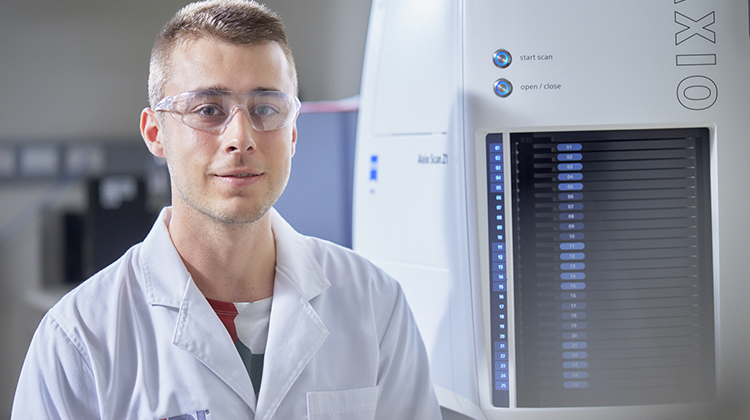Silver Linings in Uni Place Shortcomings

Even if you don’t get into your preferred course, things have a way of working out. For 24-year-old Cameron Trought failing to get into medical school was a blow but he is now engaged in an interesting career in biomedical research, working with some of the finest medical researchers in the region and getting paid while his trainee doctor friends subsist on instant noodles.
His story is one that many might find comfort in as thoughts turn to uni places and careers afterwards as the final exams kick off this month.
Cameron says missing out on medical school has been the best thing that could have happened as he warns school leavers not to put too much emphasis on their results.
“I didn’t think it at the time, but honestly missing out on medical school has been the best thing that’s ever happened, because it redirected my life into something much more rewarding.
“I got rejected from medical school and at the same time I had friends get in and are now on their way to being doctors, but when I look at what I get to do, to be at the absolute coalface of medical research, I know it was the right choice for me,” he says.
Cameron is now working at the Heart Research Institute (HRI), helping to create a new generation of effective blood thinners to dissolve stroke causing blood clots.
“The ultimate goal is a drug which can be administered by paramedics in ambulances to help dissolve a blood clot causing stroke during those critical minutes before a patient reaches hospital,” says Cameron.
There are 32,000 researchers in Australia - a career path which is growing.
As you know, clever New Zealanders immediately become honorary Australians and Cameron did a bachelors at The University of Auckland in Biomedical Science, and kept it very general with interests in pharmacology, pathology and nutritional science before decamping for Sydney Uni.
“I did my honours research degree here in Australia at Sydney University with the Heart Research Institute (HRI) and my focus was on looking at the effects of the anti-inflammatory drug colchicine on reducing heart disease risk,” he says.
At first, medical research it wasn’t something even remotely on his radar as he really wanted to go to medical school but failing at the last hurdle made a rethink necessary.
“I got to the end and was rejected after my interview. It was incredibly difficult at the time. I finished off my bachelors degree and had an interest in wanting to do some research summer internships to see if research might be for me. A friend told me about summer internship positions at HRI that were available to New Zealanders, and I really wanted to explore heart research largely from personal family experiences. My Grandmother had had a series of small strokes that had led to development of vascular dementia. It was really hard for us as a family to see, and I wanted to do something that if it couldn’t help her, that could maybe help people like her in the future.
“The interview process was very much led by my previous recruiting supervisor. He was looking for someone who was genuinely excited about one of his projects and if they enjoyed their summer internship experience, would be open to staying on for honours. The key factors really seemed to be around curiosity, interest, and passion in the area.”
A large amount of his day is spent in the lab and some of the experiments he performs regularly include carrying out blood clotting experiments to see how the novel anti-coagulant compounds they are working with compare to those existing in clinics already.
“I also compare our novel compounds with the existing ones to compare bleeding risks as this is a major concern with existing anti-coagulants. A lot of the day is also spent discussing with my teammates, and supervisors; analysing data and planning our next steps for experiments. There’s often a fair bit of desk work to squeeze in around the lab work as well, with writing and preparing occasional presentations often the focus here. There’s always a lot of varied things to do and that keeps things really interesting and engaging.
“My friends are still in medical school and I’ve had the experience before my PhD to work full time as a Research Assistant with the Thrombosis Lab. It certainly felt great to be earning full time a little earlier than I otherwise would have, had I been in med school like them. During my PhD study, I’m very grateful to be supported by a NSW Health Biotechnology Industry Partnership Scholarship which is a very generous scholarship, funded by NSW Health, HRI, and also our labs associated biotechnology company ThromBio.”
He says the HRI workplace is full of passionate, talented and amazing people.
“My supervisors provide a huge amount of direction and support with the project day to day, and also really care about my career development overall. My coworkers who I work alongside with in the lab, really help drive the project and consistently bring new ideas and problem-solving solutions.
“I really want to stress that I’m one person who is a part of a really great team. I think our positive team dynamic is a huge part of what allows us to do good work and push along our research. I’d definitely recommend for younger people wanting to get into research to really value finding supervisors and a team where personalities mesh. I feel very grateful to work with such a great group of people who I respect and really enjoy working with.”